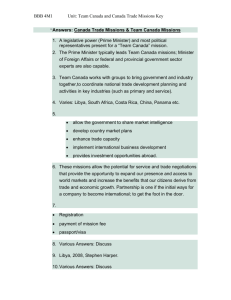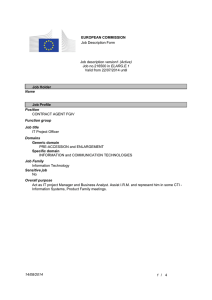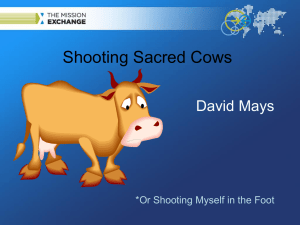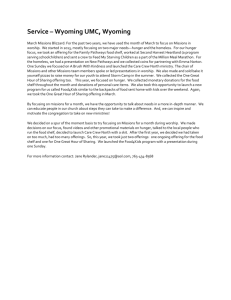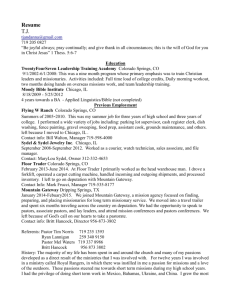Self Evaluation and Survey of Your Missions Department
advertisement
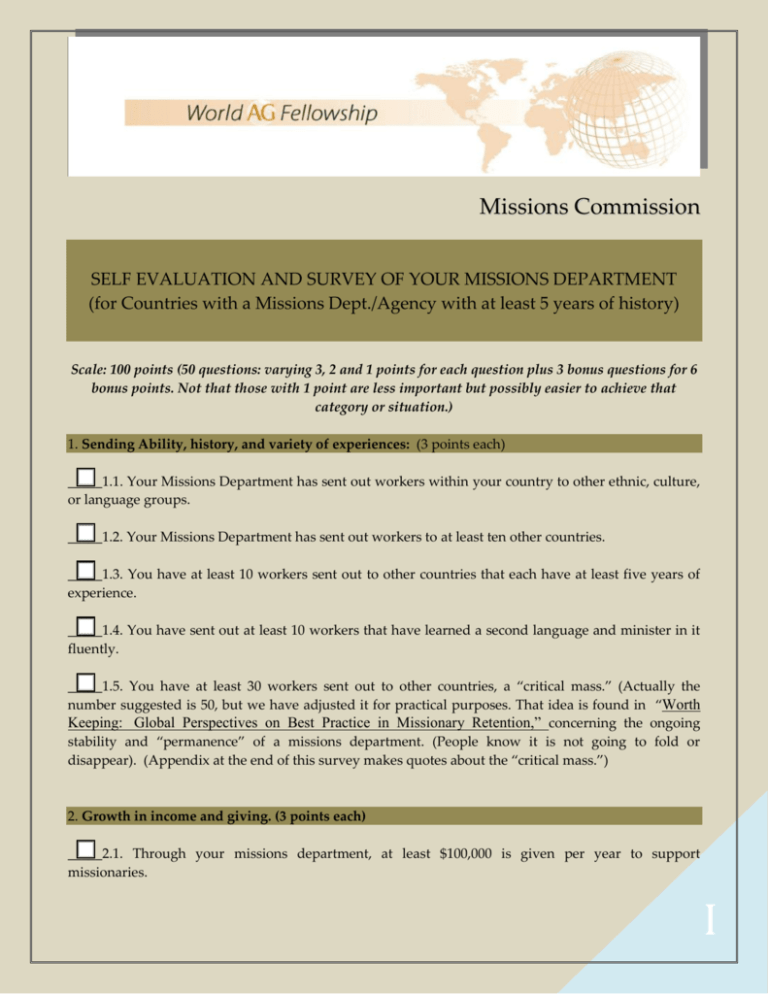
Missions Commission SELF EVALUATION AND SURVEY OF YOUR MISSIONS DEPARTMENT (for Countries with a Missions Dept./Agency with at least 5 years of history) Scale: 100 points (50 questions: varying 3, 2 and 1 points for each question plus 3 bonus questions for 6 bonus points. Not that those with 1 point are less important but possibly easier to achieve that category or situation.) 1. Sending Ability, history, and variety of experiences: (3 points each) _____1.1. Your Missions Department has sent out workers within your country to other ethnic, culture, or language groups. _____1.2. Your Missions Department has sent out workers to at least ten other countries. _____1.3. You have at least 10 workers sent out to other countries that each have at least five years of experience. _____1.4. You have sent out at least 10 workers that have learned a second language and minister in it fluently. _____1.5. You have at least 30 workers sent out to other countries, a ‚critical mass.‛ (Actually the number suggested is 50, but we have adjusted it for practical purposes. That idea is found in ‚Worth Keeping: Global Perspectives on Best Practice in Missionary Retention,” concerning the ongoing stability and ‚permanence‛ of a missions department. (People know it is not going to fold or disappear). (Appendix at the end of this survey makes quotes about the ‚critical mass.‛) 2. Growth in income and giving. (3 points each) _____2.1. Through your missions department, at least $100,000 is given per year to support missionaries. I _____2.2. Income in the last year grew at least 20% from the year before. (for countires with less than $100,000 and 10% for those with more than $100,000 in income) in comparison to the year before. (in a stable currency such as dollars or euros) _____2.3. There are at least 10% of your churches that take up faith promises and special missions offerings. _____2.4. Your missions department has surpassed $150,000 per year in giving to support your missionaries. _____2.5. There is more income in the missions department than there is in the administrative fund of the national church office. 3. Leadership and office personnel (2 points each) _____3.1. The missions department has a functioning office. (Meaning: space, phones, hours of operation) _____3.2. At least one member of the missions committee serves full time. _____3.3. There is at least two full time secretaries in the office. _____3.4. The missions department is able to support itself from a percentage taken out of the offerings (or other means of funds generated in the country) and does not depend on outside funds for the support of their office and full time personnel. _____3.5. The missions department has a total of five or more full time personnel. 4. Administration of Funds (2 points each) _____4.1. There is a central account or fund that receives the funds and offerings for the missionaries and the missions department administers all the offerings received. _____4.2. Receipts are prepared for the donor of each offering received. _____4.3. The missionaries are required to fill out periodic reports on how they spent the work funds, (not personal salary) and send in some of the larger receipts. (example monthly or trimester) _____4.4. The missions department prepares a yearly report of offerings received. _____4.5. The missions department is accountable, on a periodical basis, to the national church in the manner in which funds are administered, and they are audited annually. 5. Savings and Responding to Emergencies (3 points each) II _____5.1. The missions department has money in the bank and is able to loan funds to the missionaries in case of an emergency. _____5.2. The missions department has at least $20,000 in the bank at all times. _____5.3. The missions department has at least $50,000 in the bank at all times. _____5.4. The missions department has some kind of ‚reserve‛ fund which takes out and saves money from the missionary’s offerings for their return ticket back to their country. _____5.5. The missions department provides a statement each month of the offerings received and the missionary knows how much money they have in their internal ‚account‛ within the missions department. 6. The Commission and how they make decisions. (1 point each) _____6.1. There is a commission, and not just one person in charge of the department. _____6.2. The commission of the Missions Department meets at least once every two months. (six times a year) _____6.3. The president/leader does not make major decisions by themself, but they are made by the commission. _____6.4. When a missionary is approved for appointment, they have an interview with the commission. _____6.5. There is a missions manual in writing that covers major policy, politics, philosophy and procedures of the department, so the missionary candidate knows how the missions department operates. 7. Languages and communication with other countries (1 point each) _____7.1. There is at least one member of the commission that speaks English. _____7.2. There is one member of the office that can receive or give basic communication in English. _____7.3. There is at least one member of the commission or office that speaks or reads another major language other than their own or other than English, such as French, Portuguese, etc. _____7.4. The department has the ability to translate and get key documents to the people that need them. III _____7.5. The missions department, if it needs to make contact with a new country for the placement of a missionary, knows how to get the proper contacts of the leaders of that country and get in contact with them. 8. Training Programs. (2 points each) _____8.1. The missions department has an orientation program for new candidates. _____8.2. The missions department has a yearly program to minister to and train those home on ‚deputation.‛ _____8.3. There is a formal training program (Bible School, institute, missions training school of at least a year for training young people with a burden for future missionary service. _____8.4. There is at least one professor in missions training programs that has been a veteran missionary. _____8.5. The formal missions training program has participation by the missions department and is at least partially accountable to the missions department. (in other words, it doesn’t depend only on the Christian Education or institution). 9. Support programs to facilitate the missionary vision (2 points each) _____9.1. There are support programs such as missions promoters, to help advance the missionary vision. _____9.2. There is a program to help promote missions among children, youth, or adults, one of the three or even all three. _____9.3. There is some type of program to coordinate intercession and prayer in favor of the missionaries. _____9.4. There is some type of program or network to help put future missionaries in contact with the missions department. _____9.5. Your missions department has promotional material to offer without cost to the churches. 10. Pastoral or Member Care (1 point each) ____10.1. The Missions Department provides part of the pastoral care for the missionaries. ____10.2. The local churches also provide part of the pastoral care for the missionary, and don’t ‚wash their hands‛ of the member care of the missionary. IV ____10.3. You have someone in the missions department that has pastoral care as part of their portfolio. ____10.4. Missionaries have been visited in their place of labor by members of the Missions Department. ____10.5. There are bulletins or letters written by the missions department on a monthly basis to the missionaries. Extra “credit” points: (2 points each) _____1. One or more of your full time leaders in your missions department has been a missionary. _____2. Your income has grown three years in a row at least 20% a year average. (total of at least 64%) _____3. (for situations where the answer to 2.5 is ‘yes,‛): The leadership of the general council rejoices with the growth of the income to the missions department and is not concerned or bothered that more funds are given to missions than for the administration of the national answer. (If the answer to 2.5 is ‚no,‛ this question is not valid). POINTS: 1. Sending ability, history, experience: 2. Growth in income and giving: 3. Leadership and Office Personnel: 4. Administration of Funds 5. Savings and Responding to Emergencies 6. Commission and Decision Making 7. Languages and Communication 8. Training Programs 9. Support Programs 10. Pastoral Care Extra Credit Bonus Point Total: GRADING SCALE: 0-20: Pioneer stage: V If your department is just starting, good job in getting started and don’t be discouraged. All beginnings take time and a good foundation is important to build on. You can measure your growth year by year. If you department is 5 years old or more, it is just ‚barely‛ functioning. It will have difficult problems in growing and gaining credibility unless severe and urgent changes are made. As well, you are in ‚danger‛ of churches that have a missions vision deciding they would rather ‚go it alone,‛ because they view the department as inefficient, unnecessary, and without purpose. You need to urgently work towards getting past this barrier of the ‚pioneer stage.‛ 20-40: The gaining credibility stage: You have made many gains but there are many ‚battles‛ to be won and overcome. There is possibly much spiritual warfare trying to keep you from advancing. You are not in a ‚pioneer‛ mode, but neither do you have lots of ‚credibility.‛ You must keep moving forward to gain credibility so people will know you are a legitimate organization, and ‚here to stay,‛ not something that will fold and disappear. If you are still in this stage after 10 years, it shows severe problems that must be overcome. 40-60: Growth stage: You still have a long way to grow, but you are growing in many areas and have momentum and the potential to leap into the next stage. 60-80: Consolidation: (In school, you would have a C or a D on your report card in the 60-80 range) Not only do you have a credible, solid structure, but you are preparing the foundation for future growth and anticipating it. 80-100: Respect and “Mature” missions department/sending agency: (In school, you would have a B or an A on your report card in the 80-100 range) Your missions department has a good testimony before the pastors and national work. Many still do not understand the vision, but everyone ‚respects‛ the achievements and advances of the missions department, as well as her testimony. Possibly many other departments or even leaders will try to emulate areas of the missions department that have been models of leadership. Comment: A “mature” missions department does not mean that the country has a MATURE MISSIONS VISION. But a mature department will be advancing towards that goal: a “mature” missions vision. A “Mature Missions Vision” is more difficult to measure, because it is reflected in the ATTITUDES of the HEART, and not just ACTIONS of a STRUCTURE. What are the 5 characteristics of a country having a ‘mature” missions vision? 1. There is only a minority of people who say and think: ‚Think of all that we could do with that money if we invested it here and didn’t send it ‚to other countries.‛ The majority have this contrasting VI mentality: ‚What a blessing to be able to invest in other countries and God will bless us for it.‛ If a missions departments income is greater than that of the support for the national headquarters, people rejoice and are not bothered by that fact. They realize it is a matter of priorities that the church gives a lot to missions. 2. The Pastors and churches have a correct theology of missions and realize the importance of the great commission as a priority. The people of God are committed to God’s missional purposes. 3. Pastors and churches think ‚We want to sow our best workers in the nations of the world. When we sow ‚people‛ God also blesses us with more ‚leaders, and people.‛ 4. Pastors and leaders consider the missions department not just ‚another department,‛ but the heartbeat of the church and at the forefront of the church’s growth and advancement. 5. Pastors and leaders feel that ‚No matter how many needs we have in our own country, we must obey the great commission, and we can send missionaries.‛ Contrasting immature vision: ‚There are so many needs in our country that we can’t send missionaries.‛ Final Reflections and Introspection: 1. What stage are you in now? 2. What can you do to get to the next stage? 3. How long should it take you to get to the next stage? 4. What specific short term goals will help you get there? 5. What long term goals do you have to stretch BEYOND the next stage? Appendix: Concerning the ‚Critical Mass‛ of 50: From: Worth Keeping: Global Perspectives on Best Practice in Missionary Retention, Roy Hay, et al, 2007: William Carey Library. The idea of the “critical mass” is taken from Chapter 4: Agency Size and Partnerships. VII p. 39 "´Bigger is better. . . at least up to a certain size: 50, in fact. ReMAP II has demonstrated that very small missions agencies across NSC and OSC lose people at an alarming rate of 33% per year. Larger agencies do much better with the loss of just 6% in OSC (Old Sending Countries, Australia, Europe and North America) and 1.3% in NSC (New Sending Countries, everyone else). p. 40 "The structural limitations of small agencies are significant, but they are not so critical as to explain the relatively huge size of their attrition rates: so we need to look for other explanations. It appears that mission agencies resemble a wood fire where burning pieces mutually heat each other and thus keep a fire burning. Set aside, a burning log will soon die out as it now loses more heat than is produced and received. In a similar way mission agencies need a 'critical mass' of workers to secure a mix of gifts and experience, generate a stimulating and inspiring atmosphere, cover the various ministries and roles, provide mutual support and overcome situations of crisis." They go on to say that they only way that smaller agencies can avoid high turnover is to network with other agencies, share office staff, expertise, counseling services, etc. That way they can keep the missionaries on the cutting edge and not lose them. May God help all of us to ADVANCE, and if we are in one stage one year, not to be in that same stage 2-3 years later. Together…we can all advance to reach the least reached in our generation! VIII
